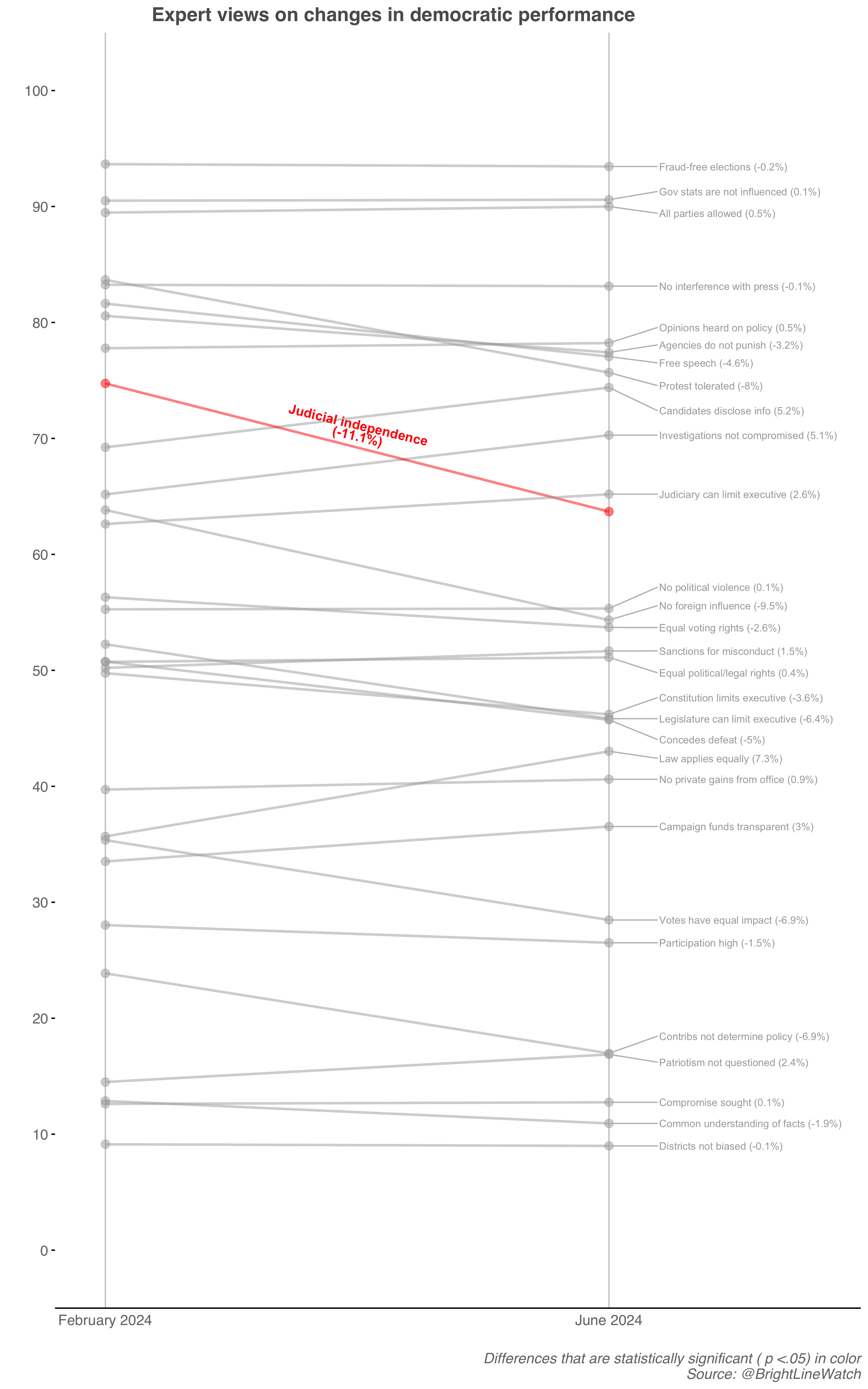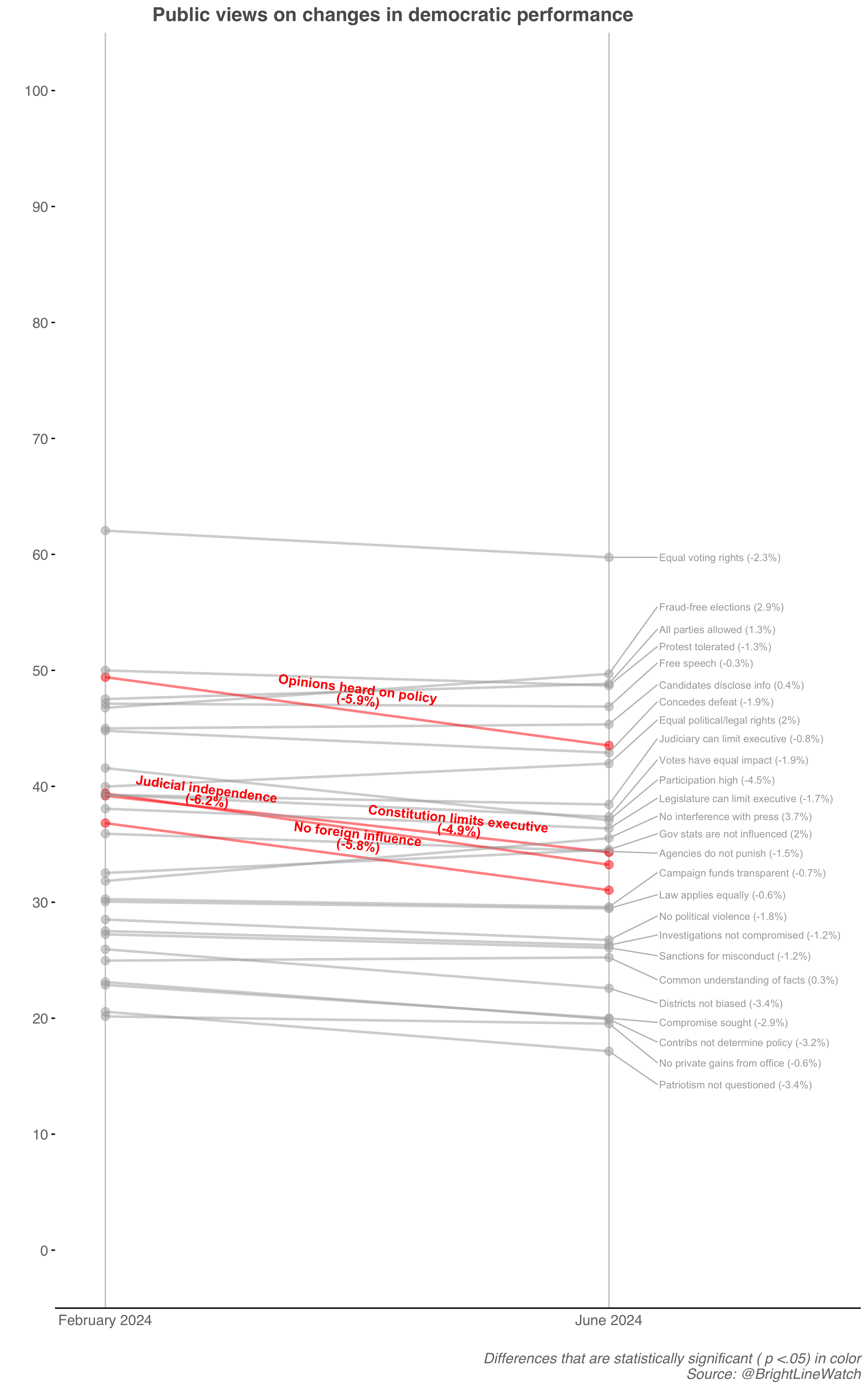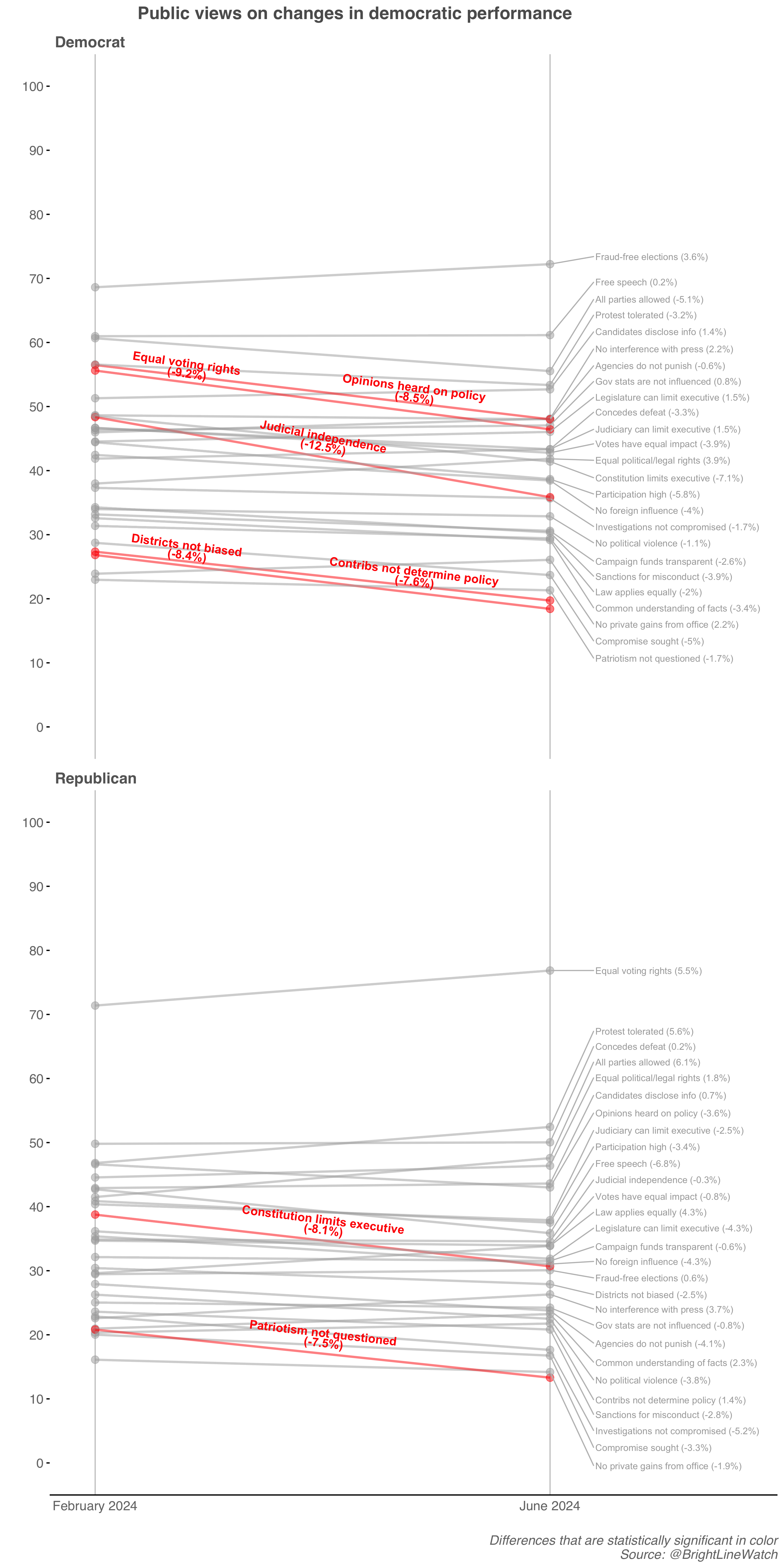From Convictions to Elections: U.S. Democracy Amid Legal Turmoil
Bright Line Watch June 2024 surveys
In most presidential election years, late spring and early summer provide a relatively quiet interlude between primary season and the party conventions. This year, however, the conviction of former President Donald Trump on 34 felony counts and a series of landmark Supreme Court decisions could reshape both the upcoming election and American democracy itself.
In this context, we fielded parallel surveys of 557 political scientists from June 20–30, 2024 and a representative sample of 2,775 Americans from June 20–27. Given the importance of precisely measuring GOP perceptions of topics such as the 2020 election and prosecutions of Trump, the public survey included an oversample of Republicans. It is, however, weighted to be representative of the American public as a whole.
Our key findings are the following:
Perceptions of legal cases related to the presidency
-
The public is now evenly split on whether Donald Trump committed a crime in the New York hush money case with 49% believing he did (versus 43% in our last survey, in February). Democrats increasingly think he did commit a crime and favor prison time as punishment; Republicans say he did not and oppose any penalty. Experts now overwhelmingly believe Trump committed a crime, but a majority of them recommend a fine or probation.
-
A majority of the public, and nearly 40% of experts, are suspicious of the district attorney’s motive in pursuing the New York case against Trump, believing that other people would not have faced charges for the same actions.
-
Majorities of experts similarly view a range of cases against both Trump and prominent Democrats as politically motivated. Among the public overall, higher shares regard these cases as fair and impartial (though Republicans view the cases against Trump as politically motivated).
-
Even before it announced its controversial decision on presidential immunity, confidence in the Supreme Court’s impartiality on cases related to Trump was low — just 48% among the public overall, 33% among Democrats, and only 23% among our expert sample.
-
Public beliefs on judicial recusal in cases involving Trump are sharply polarized by party. Democrats support recusal by Samuel Alito and Clarence Thomas, two Republican-appointed Supreme Court justices, and Republicans support recusal for the judge in the New York case against Trump. Overall, support for recusal is high, indicating general suspicion toward courts.
-
65% of Republicans (and 16% of Democrats) support the proposition that the next Republican president should bring criminal charges against Joe Biden and other Democrats in response to the indictments of Donald Trump. However, exposure to a statement by a Republican member of Congress explicitly calling for retaliatory prosecutions has no effect on support for such prosecutions among Republicans and decreases support for them among Democrats.
Perceptions of threats to democracy
-
Prior to the Court’s decision in Trump v. United States, only one in four Americans supported presidential immunity from prosecution (though a narrow majority of Republicans supported it). Experts viewed the prospect of the Supreme Court upholding presidential immunity and Trump prosecuting his political opponents as grave threats to American democracy.
-
If Trump is reelected in November, experts say it is very likely he will suspend prosecutions against himself, dismiss special counsel Jack Smith, pardon one or more January 6 protestors, issue a self-pardon, and open an investigation of Joe Biden. Overwhelming majorities of Republicans would support these actions while overwhelming majorities of Democrats would oppose them. Majorities in both parties, however, say they would not approve of Trump attempting to stay in office past 2029 (a prospect experts rate as 53% likely).
Perceptions of presidential elections
-
The partisan divide over whether Joe Biden was the rightful winner of the 2020 presidential election remains largely unchanged from previous surveys. In particular, a Republican supermajority continues to reject the legitimacy of Biden’s election.
-
Looking back to 2012, large majorities of both Republicans and Democrats recognize Barack Obama as the rightful winner of the presidential election that year. For the 2016 election, Republicans overwhelmingly recognize Trump’s win but 38% of Democrats do not. For 2020, Democrats overwhelmingly recognize Biden’s win but 65% of Republicans do not. For the public overall, recognition of the outcomes in these presidential elections has declined from 90% to 77% to 66%.
-
Prospective confidence in the integrity of the 2024 vote count is above 90% among Democrats for local and statewide counts, and 88% at the national level. Among Republicans, only 55% are confident of the integrity of the vote count nationwide. Republicans’ confidence in local (79%) and state (78%) vote counts is higher, but still lower than among Democrats.
Perceptions of democracy overall
-
Perceptions of the overall performance of American democracy are stable. Democrats express more favorable views than do Republicans, but political science experts rate American democracy higher than do either group. These ratings have stabilized near their post-2017 high.
-
However, expert projections are less optimistic when asked to forecast the state of U.S. democracy rating in 2027 if Trump wins re-election, anticipating a decline to levels similar to Bolsonaro’s Brazil.
Legal proceedings and the presidential election
Of the four criminal cases facing Trump, the case brought by New York County District Attorney Alvin Bragg was widely viewed as the least consequential. Various commentators argued that the case relied on a new and convoluted legal theory and that the actions Trump was accused of – falsifying business records – were relatively benign, especially compared to the charges made by special counsel Jack Smith. Nonetheless, Bragg secured a conviction in late May, a few weeks before our survey.
To estimate the effects of the guilty verdicts in that case, we asked both our expert participants and the representative public sample whether they think Trump had committed a crime in his “handling of hush money payments to an adult film actress.” The figure below shows the percentage of respondents who regard Trump to have committed a crime in that case in our June 2024 data compared to prior surveys conducted in June/July 2023 and February 2024.
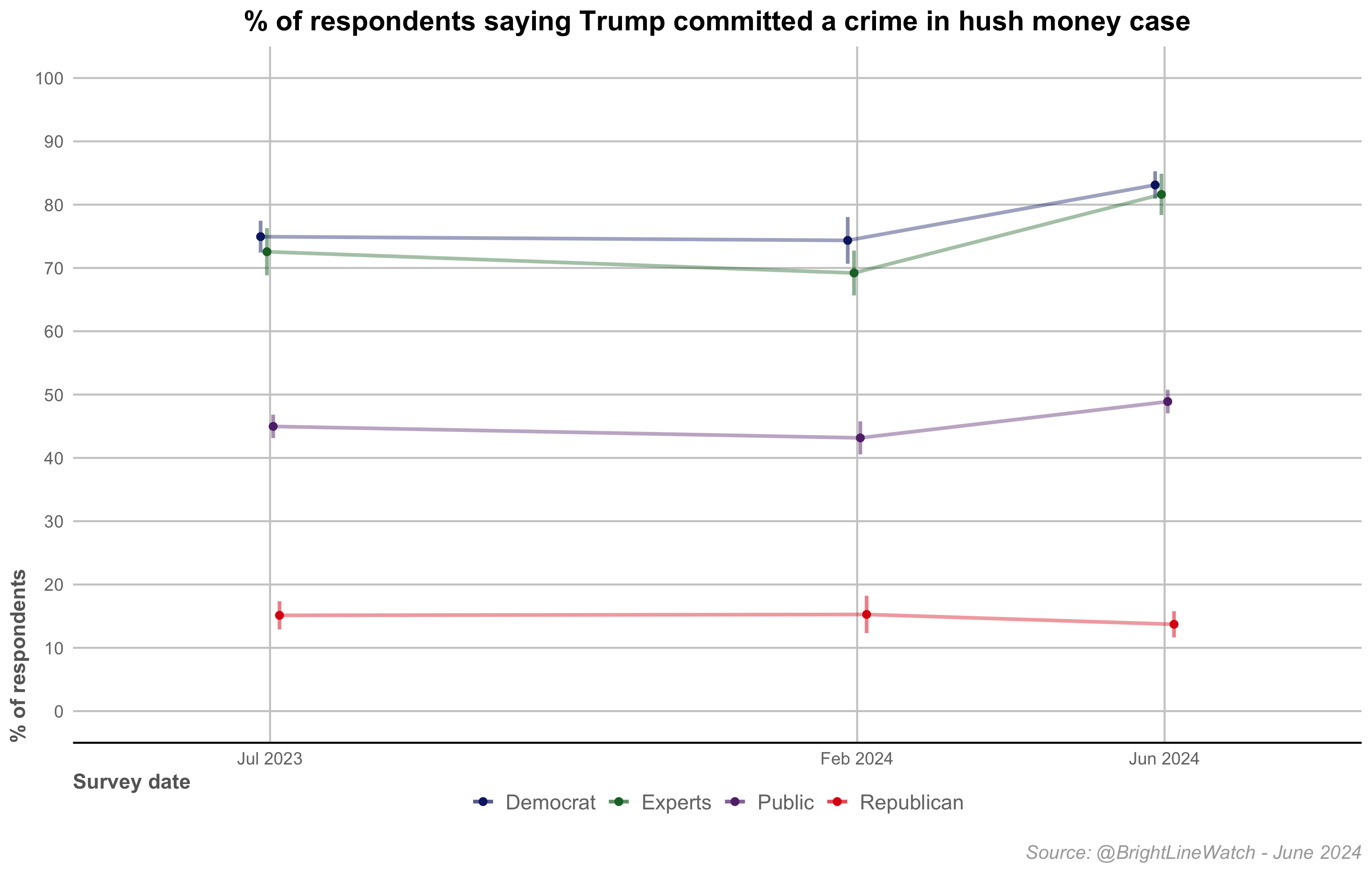
The intense media attention that the trial and conviction attracted and the presentation of evidence by the prosecution appears to have moved attitudes. Among the experts, 82% now believe Trump committed a crime — up from 69% in our last pre-trial survey in February of this year. 9% of experts say that Trump did not commit a crime in this case and an additional 9% say that they do not know. Expert beliefs that Trump committed crimes in the New York case are still lower than the beliefs they expressed in our February survey about his handling of classified documents after leaving the presidency (93%) and his efforts to overturn the 2020 election (91%).
Among the public overall, 49% now believe Trump committed a crime — also up from February, although by a smaller margin of six points. Among Democrats, belief Trump committed a crime increased from 75% in February to 83% in June. By contrast, Republican beliefs about criminality, at 14%, were relatively unmoved by the trial and convictions (down just 2 points from February).
We also asked respondents who said Trump committed a crime in the hush money case about the appropriate punishment: none, a fine or probation, or a prison sentence. The figure below plots these quantities as a proportion of each group as a whole. (We pooled those who said Trump did not commit a crime and those who said he did but that he should face no punishment for doing so; the latter quantity is always negligible.) The figure thus represents the percentage of experts, Democrats, independents, and Republicans who think Trump should face a given level of punishment.

Among experts, the majority view is that Trump should face a fine or probation, but not prison, for the New York convictions. This position is out of step with the public sample, which is polarized between strong support for prison time, at 62% among Democrats, and opposition to any penalty, at a near consensus 87% among Republicans but also at 55% among independents. There is no public consensus view on how harsh Judge Juan Merchan’s penalties against Trump should be. Moreover, the recent Supreme Court decision on presidential immunity raises uncertainty about whether the convictions will survive appeal. Judge Merchan has postponed sentencing until September – just two months before the presidential election.
We also asked respondents who said that Trump had not committed a crime whether they believed Trump did not do what he was accused of (i.e., the factual claims in the cases are false) or that Trump took the alleged actions but they did not amount to a crime (i.e., he is being wrongly prosecuted for actions that are not illegal). Respondents who said that they did not know if Trump had committed a crime were not asked this follow-up question.
The next figure shows that, among each group, more people denied the criminality of Trump’s alleged actions than the actions themselves. Despite the case made by prosecutors in New York, nearly half of Republicans, and 21% of independents, believe Trump committed the actions in question but remain unpersuaded that they constituted a crime.
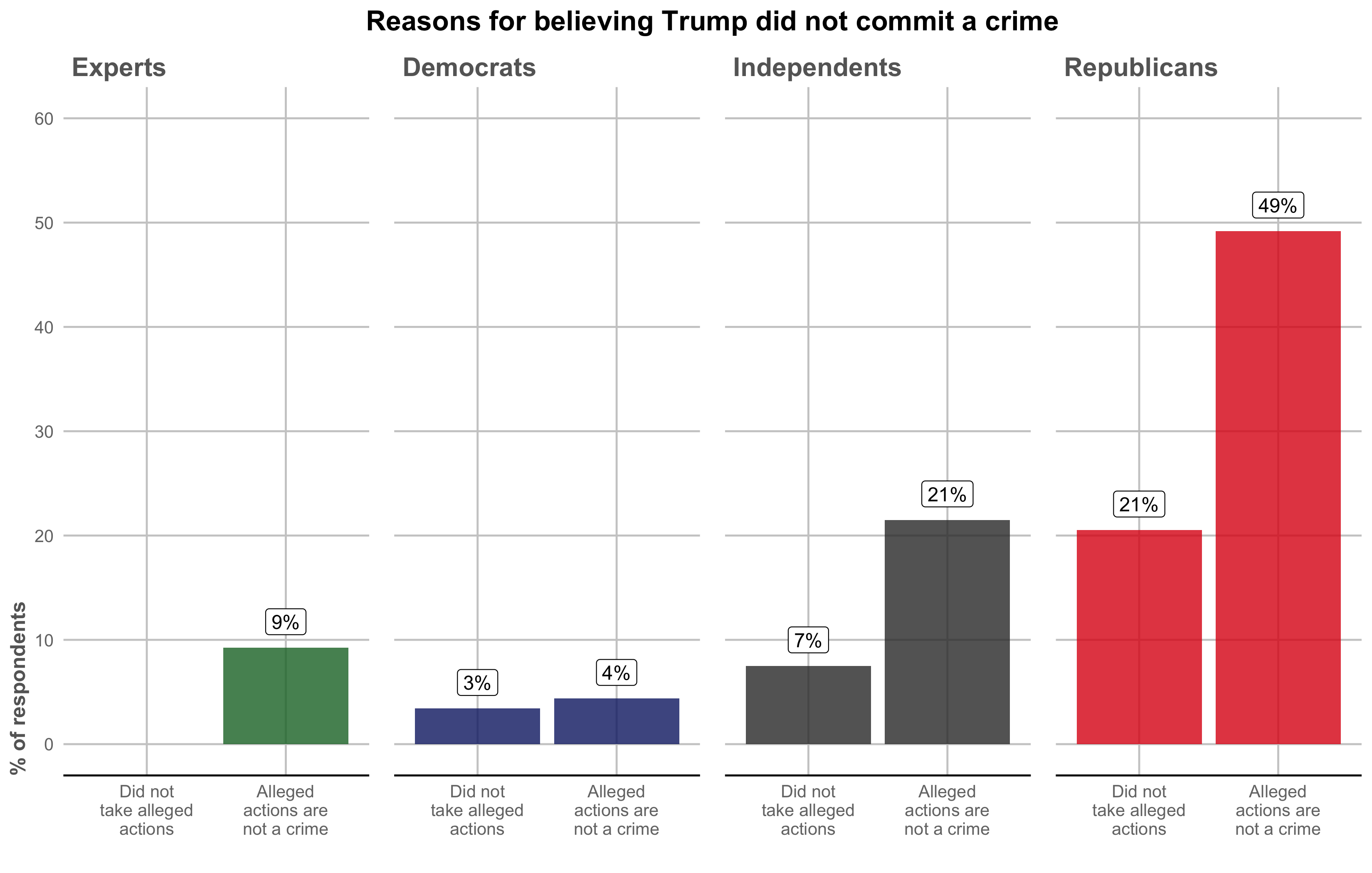
Trump, meanwhile, maintains that the criminal charges against him are politically motivated. To determine how widely that belief is held, we asked both experts and the public whether they agreed that, in the hush money case, “Trump would not have been prosecuted if he were someone else.” We previously asked this question in July 2023 and in February 2024.
The figure below shows the percentages of experts, the public overall, and of Democrats and Republicans among the public who say that Trump was treated differently by prosecutors.

Although Bragg’s team persuaded most Americans, and most experts, that Trump took the actions in question, many remain suspicious of the prosecution’s motive in pursuing the case. Among the public overall, a solid majority of 56% says Trump was targeted because of who he is — a number that has barely changed since last year despite the trial and convictions. Republicans (87%) and Democrats (28%) are now even more polarized on this question, moving slightly further apart in the wake of the trial. Among experts, 37% agree that Trump would not have been prosecuted if he were someone else — slightly down from February (40%) but still higher than July 2023 (32%). These numbers, however, are notably lower than the 62% of experts who view the case as motivated by politics (discussed further below), suggesting that there is substantial nuance in experts’ assessment of the case.
Political influence in high-profile prosecutions
Trump and many of his supporters claim that the Biden administration has weaponized the government’s prosecutorial power. We sought to assess whether the public and experts see recent prosecutions of prominent political figures as politically motivated. Each respondent was presented information about four prosecutions randomly drawn from the following list of eight:
- Hunter Biden for allegedly lying on his application to purchase a handgun
- Hunter Biden for allegedly committing tax evasion
- Democratic Congressman Henry Cuellar (TX) for allegedly accepting bribes
- Democratic Senator Robert Menendez (NJ) for allegedly accepting bribes
- Donald Trump for allegedly retaining classified documents after leaving the presidency in 2021
- Donald Trump for allegedly participating in criminal conspiracies in his efforts to overturn the 2020 presidential election
- Donald Trump for allegedly falsifying business records in order to influence the 2016 presidential election (by New York state prosecutor Alvin Bragg)
- Donald Trump for allegedly conspiring to overturn the result of the 2020 presidential election in Georgia (by Georgia state prosecutor Fani Willis)
The first six prosecutions listed are cases brought by the Biden Justice Department while the last two were brought by state prosecutors. The first four target prominent Democrats whereas the last four concern Trump. Respondents were each shown two cases with a Democratic defendant and two with a Republican defendant.
After being shown each item, participants were asked, “Do you believe this prosecution has been conducted in a fair and impartial manner or do you believe it is motivated by politics?” The figure below shows, for our expert and public samples (left panel), and for the public broken out by partisanship (right panel), the percentages who indicated whether a prosecution they were shown was probably or definitely motivated by politics.
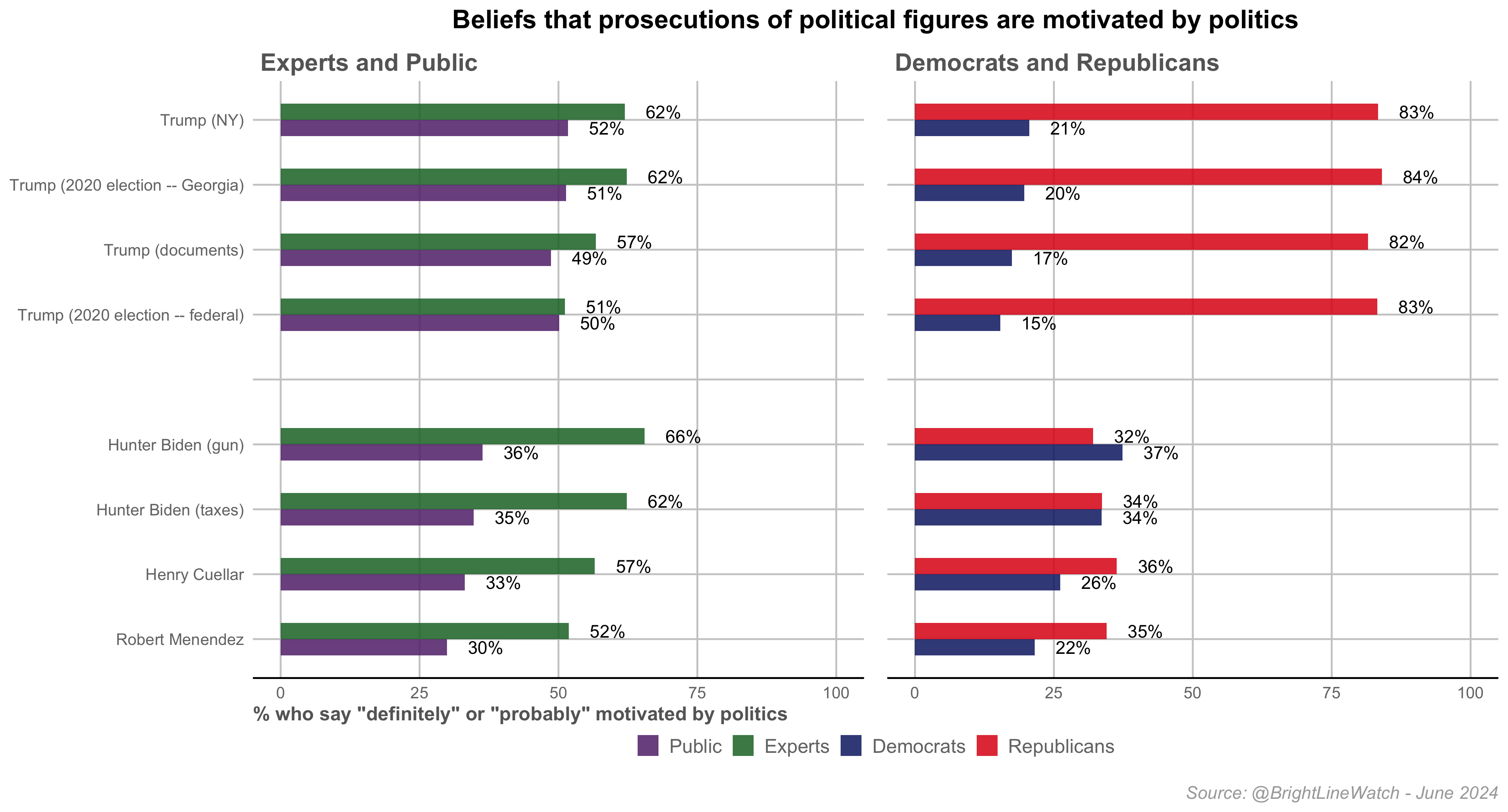
Overall, experts were more likely than the public to see political motivations in prosecutions of public figures. In each case, a majority of experts view the prosecution as politically motivated. Experts, moreover, regard both the Trump prosecutions and those of Democratic figures as motivated by politics.
The public, by contrast, is more inclined to regard the prosecutions of Democrats as fair and impartial (64–70%) than those of Trump (48–51%). Breaking out the public responses out by partisanship, we see the familiar pattern of polarization on the Trump prosecutions but not those of Democratic figures. Overwhelming majorities of Republicans (82–84%) see every Trump prosecution as politically motivated whereas equally large majorities of Democrats (79–85%) regard each as fair and impartial. For prosecutions of Democrats, however, the polarization disappears. Solid majorities among both parties (63–78% among Democrats, 64–68% among Republicans) view each as fair and impartial.
After completing this survey battery assessing the politicization of prosecutions, each participant was asked to assess the accuracy of the following statement, which summarizes a claim made repeatedly by Trump: “Joe Biden is directing the Justice Department to prosecute his political enemies.” The figure below shows the percentage of respondents — among experts and the public overall and then separately for Democrats, Republicans, and partisan independents in the public — that regard the statement as very or somewhat accurate.

Retaliatory justice
Calls for retaliatory prosecutions – from Trump and from other prominent Republicans – have increased in recent months. We therefore first asked respondents in our public sample whether they agreed that “the next Republican president should bring criminal charges against Joe Biden and other Democrats in response to the indictments of former president Donald Trump.” Among Republicans, support for retaliatory prosecutions is widespread – 65% agreed with the statement (36% strongly and 29% somewhat). Only 36% agree among independents, however, and even fewer among Democrats.
To estimate the effect of public statements by Republican elites endorsing retaliatory prosecutions, we randomly presented half of our public survey participants with the following (factually accurate) statement:
In response to Donald Trump’s conviction in a New York state court in May for falsifying business records, Congressman Ronny Jackson (R‑TX) called for prosecutions of President Biden and his family, saying, “I am going to encourage all of my colleagues and everybody that I have any influence over as a member of Congress to aggressively go after the president and his entire family, his entire crime family, for all of the misdeeds that are out there right now related to this family.”
All public participants were then asked whether they support or oppose efforts to prosecute President Biden and his family. The following figure shows the percentage that strongly or somewhat support Biden prosecutions by exposure to the Ronny Jackson statement:

The experiment suggests that Congressman Jackson’s inflammatory rhetoric does not increase support for retaliatory prosecution. Among Republicans, the statement has a negligible impact that does not approach statistical significance. By contrast, it significantly reduced support among Democrats. We observe a similar negative effect for the public overall and for independents, but neither result is consistently significant (the effect is only significant at conventional levels with survey weights for the public and is never significant for independents).
Presidential immunity
On July 1, the Supreme Court issued its decision in Trump v. United States, which considered his claim that he could not be held criminally liable for his official acts as president even after leaving office. The decision did not uphold Trump’s blanket claim of immunity from prosecution, but establishes absolute immunity for acts within the president’s exclusive constitutional authorities (granting pardons and communications with cabinet secretaries and in the role of commander-in-chief); presumptive immunity for acts in accordance with the president’s constitutional and statutory authority; and no immunity for unofficial acts. The Court also placed strict limits on prosecutors’ ability to use presidential acts as evidence in criminal cases against them, and precluded them from considering presidents’ motives for their actions. The decision leaves to lower courts the task of distinguishing which actions merit immunity and effectively eliminates the prospect that the case involving the former president’s role in attempting to overturn the previous election can be tried before the 2024 election is held.
Our surveys were conducted immediately prior to the Court’s decision on the immunity case. We reminded our public participants that, “As you may have heard, Donald Trump’s lawyers have argued in court that former presidents should be immune from criminal prosecution for actions taken while in office.” We then asked whether they thought Trump should have immunity or not. The figure below shows percentages of Americans who believed Trump should have immunity, should not have immunity, and who said they didn’t know broken out by partisanship.
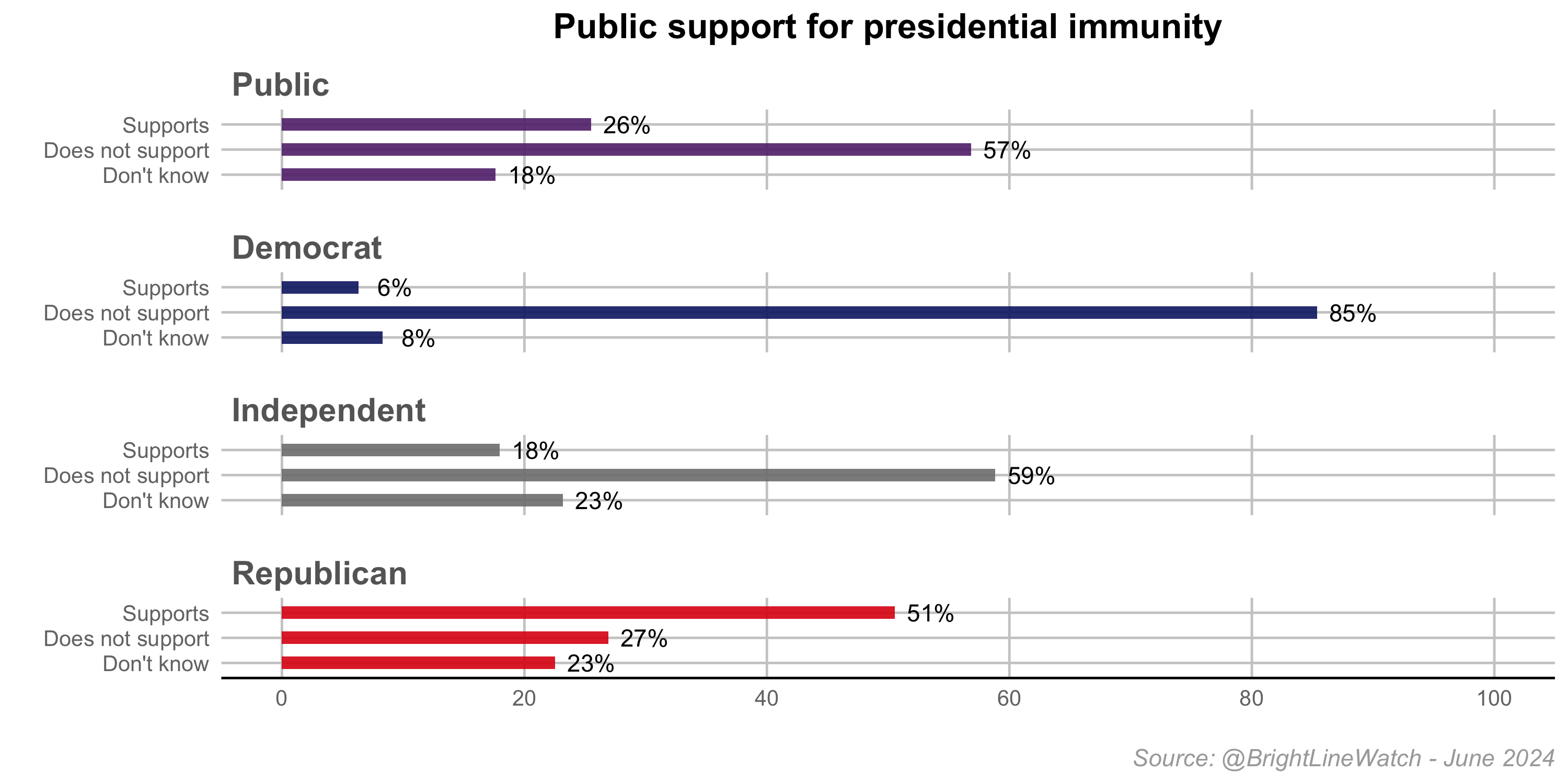
Prior to the decision, the public overall was deeply skeptical of immunity. Just 26% supported it as compared to 57% who did not (18% did not know). Opposition was overwhelming among Democrats, at 85% to 6% (8% didn’t know). Among Republicans, a bare majority of 51% supported immunity versus 27% who opposed it (and another 23% didn’t know).
Perceptions of the Supreme Court
We also asked experts and the public whether they believe the Supreme Court can be trusted to make impartial decisions in Trump-related cases before the Court issued its decision in the immunity case. The figure below shows the percentages of experts and of the public who were very or somewhat confident in the Supreme Court’s impartiality on Trump-related cases as well as levels of confidence among Democrats and Republicans in the public.

Confidence among experts in the Court’s impartiality on Trump-related cases was just 23%, far lower than the public, which split nearly evenly at 48%, though Republicans were far more likely to be confident than Democrats, at 67% versus 33%, respectively.
We previously asked the same question about confidence in the Court’s impartiality to public participants in our February 2024 survey. The following figure shows changes in confidence in the Court’s impartiality over time. We find that confidence in the Court declined significantly from February to June among the public overall (54% to 48%, p<0.001), with the shift concentrated among Democrats (44% to 33%, p<0.001).

We note again that our survey was conducted prior to the Court’s decision in Trump v. United States, which has largely been regarded as a victory for Trump and has been criticized widely among legal scholars. It is therefore reasonable to expect that confidence in the Court could decline further and that the partisan split in confidence could widen.
Judicial recusals
Perceptions of conflicts of interest may affect confidence in the courts. We asked our expert and public participants about prominent cases in which judges have been encouraged to recuse themselves from cases to ensure there is no appearance of bias in court proceedings.
We first explained the concept of recusal to participants by providing the following instructions: “Judges sometimes voluntarily withdraw from cases in which their impartiality could reasonably be questioned, which is called recusal. We will ask you about three specific judges who have been in the news lately and who have faced calls to recuse themselves.” Participants were then asked about three controversies, two involving U.S. Supreme Court justices and one involving Juan Merchan, the judge in Trump’s New York case. (Participants were randomized either to see the Merchan item first or last; they always saw the Supreme Court items in sequence.) These items were worded as follows:
- Judge Juan Merchan oversaw the trial in New York of Donald Trump for falsifying business records in making a hush money payment to an adult film actress. Merchan donated $35 to the Democratic group ActBlue and his daughter is the president of a political marketing firm that frequently works with Democratic congressional candidates.
- The U.S. Supreme Court will soon make decisions concerning Donald Trump’s claim to presidential immunity and the January 6 rioters’ claim that their actions did not constitute obstruction of an official proceeding. Two of the justices have faced calls to withdraw from those cases. We will ask you separately about each of them.
- News outlets have reported that flags associated with the “Stop the steal” movement to overturn the 2020 election were flown at two of Justice Samuel Alito’s properties.
- The wife of Justice Clarence Thomas, Ginni Thomas, was in contact with White House officials following the 2020 election and supported efforts to overturn the results. She also attended the January 6, 2021 rally near the White House, though she did not march to the Capitol.
After seeing each item, the participant was asked whether, in their view, the judge should recuse – from the Trump hush money case on the Merchan item or from pending cases involving Trump and January 6 on the Alito and Thomas items. The figure below shows the percentages of experts, the public, and of Democrats and Republicans among the public, who supported recusal (definitely or probably) for each judge/justice in question.
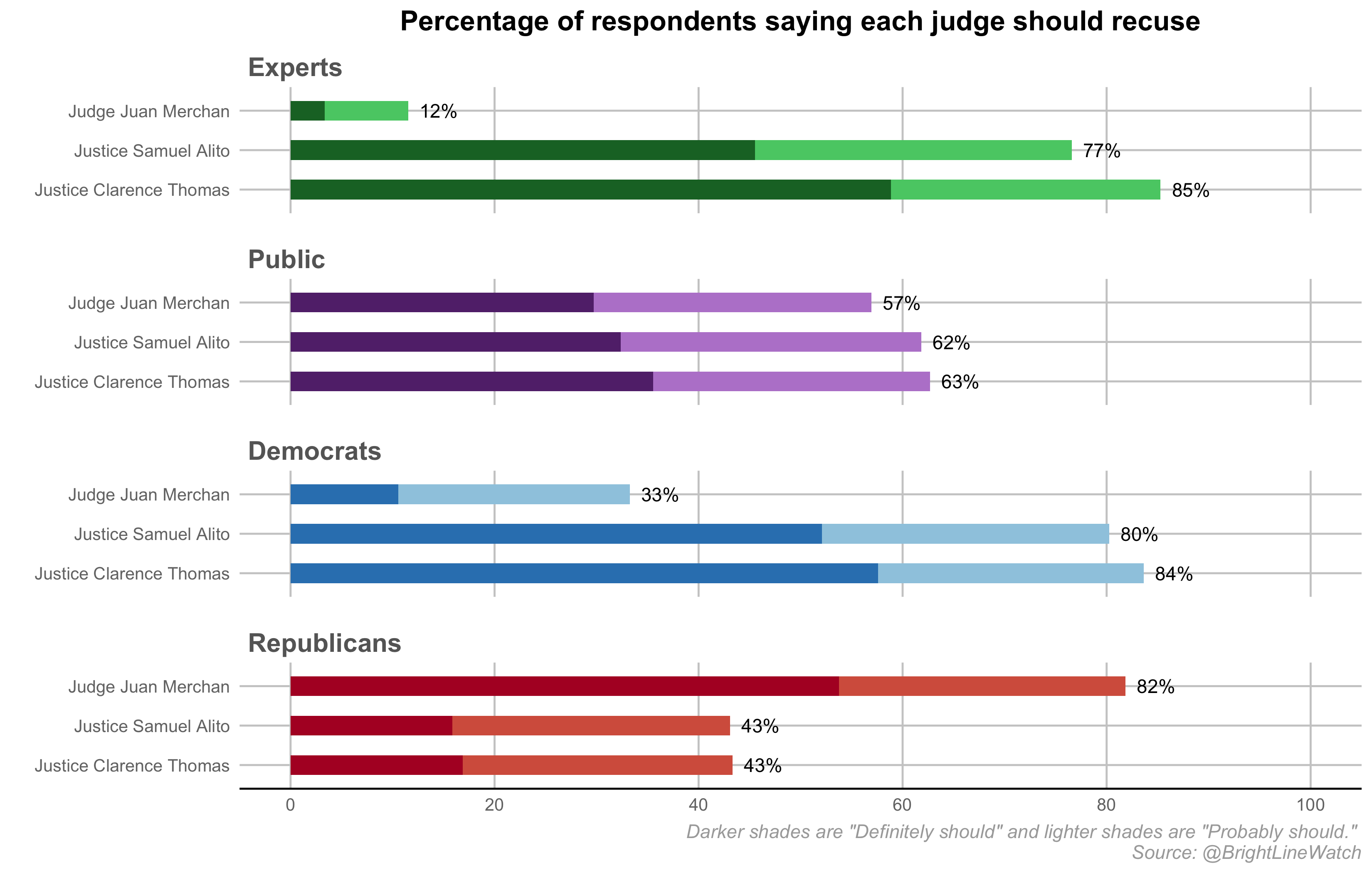
Among experts, there is little support (12%) for the argument that Merchan should have recused from the Trump hush money case due to his political contribution or his daughter’s job. Experts were far more likely to support recusal for Alito (77%) and Thomas (85%), who did not recuse on the Trump immunity case or on a case related to January 6 (discussed below).
Overall, Americans are more likely to think Merchan should recuse (57%) than experts but less likely to think than Alito and Thomas should do so (62% and 63%, respectively). When we disaggregate by party, we see a familiar pattern of polarization. Large majorities of Democrats favor recusal for Alito (80%) and Thomas (84%) but only 33% support recusal for Merchan. Republicans have the opposite view – 82% support Merchan’s recusal while 43% support Alito and Thomas stepping aside.
Current and future threats to democracy
We asked experts to assess the actual or prospective impact on U.S. democracy of the following recent events as well as possible future events.
Recent events
- Former president Donald Trump is convicted of falsifying business records in his New York state trial.
- Trump and Biden agree to hold two debates, bypassing the Commission on Presidential Debates.
- Trump repeatedly attacks the legal cases against him as interference by the Biden administration in the 2024 election.
Possible future events
- The U.S. Supreme Court upholds Donald Trump’s claim of immunity from prosecution for former presidents
- The U.S. Supreme Court decides that people who entered the Capitol on January 6, 2021 can’t be charged with obstruction of an official proceeding.
- Donald Trump follows through on his threats to initiate prosecutions of his political enemies if elected in November.
- None of the ongoing trials involving Donald Trump (the Florida documents case and the Georgia and Washington, DC election interference cases) are decided before the 2024 election.
After we put our survey in the field, the Supreme Court delivered two decisions with important implications for our list of possible future events. First, on June 28, in Fischer v. United States, the Court ruled in favor of a January 6 protestor who challenged the charge of obstructing an official proceeding, arguing that the government would need to show involvement of direct interference with official documents. The ruling narrows the Justice Department’s ability to charge dozens of those who breached the Capitol on January 6 in the manner described in the survey item.
Second, as noted above, the Court issued its decision in the immunity case on July 1. The decision was more nuanced than our short survey item in that it did not uphold Trump’s blanket claim of immunity. However, the item describes a core element of the decision, which upheld immunity for official acts and likely blocks pending federal prosecutions until after the election.
Finally, we note that the assessments we collected were overwhelmingly prospective. In total, 96% of the expert survey responses we received were collected before the Fischer decision was handed down and all were received before the Trump immunity decision.
With those subtleties in mind, the figure below shows experts’ assessments of threats and benefits to democracy posed by the events in question.

The experts overwhelmingly regarded both Supreme Court decisions as threats to American democracy. In the case regarding charges against January 6 protestors, 84% of experts said that a potential decision in favor of January 6 defendants was a threat to democracy (31% an extraordinary threat and 38% a serious threat). Similarly, in the immunity case, 93% regarded a ruling upholding Trump’s claims to immunity as a threat (60% extraordinary and 27% serious). Only 3% of experts rated either potential decision as beneficial for democracy.
We reiterate that our survey item on immunity was less nuanced than the Court’s decision. Our results should therefore not be read as reflecting the verdict of experts on the Court’s full jurisprudence in the matter. Nevertheless, the scope of immunity the Court spelled out was understood as a grave threat to democracy even within the Court itself. Justices Kagan, Sotomayor, and Brown-Jackson wrote in dissent, “The relationship between the president and the people he serves has shifted irrevocably. In every use of official power, the president is now a king above the law.” Sotomayor added, “With fear for our democracy, I dissent.”
The potential future event that most worried our expert sample — even more than the Supreme Court decisions — was that Trump, if reelected, will use the presidency to prosecute political opponents, as he has repeatedly promised to do. Nearly all our experts (96%) regard this prospect as a threat to democracy, with 77% deeming the threat extraordinary. (The Court’s decision in Trump v. United States presumably circumscribes Trump’s ability to go after Biden directly, but does not provide immunity to other individuals with whom he has come into conflict.)
Experts also broadly (85%) regarded Trump’s public attacks on his prosecutions as a threat to democracy, though they saw it as a less grave threat. Just 21% regard the threat these attacks pose to democracy as extraordinary, though 41% rate it as serious (the remaining 22% rate it as a moderate threat or posing little threat). Finally, 71% of the experts see the prospect that none of the remaining Trump prosecutions is likely to be completed before the November election as a threat to democracy (11% extraordinary, 29% serious, 27% moderate, 4% little).
Very few experts perceived the events described above as potential benefits to democracy. By contrast, 52% regard Trump’s conviction in the New York case as a benefit (compared to 16% who see it as a threat). Finally, a larger majority (68%) of experts saw the agreement by the campaigns to hold two debates as neither a benefit nor a threat (the vast majority of expert responses were collected before the first Trump-Biden debate, providing no leverage for a comparison of attitudes before and after).
Hypothetical scenarios: Likelihood and approval
We also presented both the experts and the public with a set of hypothetical scenarios that could affect the status of U.S. democracy in a potential second Trump administration (as well as filler items). We asked experts to rate the probability of each scenario taking place assuming Trump wins the election. For the public, we instead asked whether they would approve or disapprove of Trump taking the action in question. The scenarios in question, which we drew from media accounts, are listed below.
- The Trump administration directs the Department of Justice to suspend the prosecution of at least one person accused of crimes related to the 2020 election or the events of January 6, 2021.
- The Trump administration fires special counsel Jack Smith.
- Trump pardons one or more individuals accused of crimes related to the 2020 election or the events of January 6, 2021.
- Trump issues a pardon to himself for any federal crimes he’s been convicted of or federal charges he faces.
- Trump attempts to stay in power beyond the end of his term in office in January 2029.
- The Trump administration directs the Department of Justice to investigate Joe Biden or another leading Democrat.
- The Trump administration seeks to repeal and replace the Affordable Care Act (Obamacare).
- The Trump administration withdraws the U.S. from NATO.
The figure below plots each of the democracy-related items, showing the mean probability estimate (from experts) on the horizontal axis and the percentage of Republicans (red markers) and Democrats (blue markers) who approve of the action in question on the vertical axis. The dotted line connecting each red-blue pair reflects the partisan approval gap on that item.

Experts identify a number of our scenarios as near certain (above 90% likelihood, on average), including that Trump would fire special counsel Jack Smith, pardon at least some January 6 protestors, and that a Trump Department of Justice would suspend prosecutions against a President Trump. The Trump DOJ investigating former President Biden and Trump pardoning himself were judged to be slightly less probable but still more than 75% likely. In each of these scenarios, we observe sharp polarization in approval by partisanship, with strong majorities of Republicans (63–81%) approving and overwhelming majorities of Democrats (82–90%) disapproving. (As in our February 2024 survey, we found stronger support for democratic norm violations among Republicans whose primary loyalty is to Trump rather than to the party — see appendix.) On one critical item, however – President Trump attempting to remain in office beyond the 2025–2029 term – our public respondents were less polarized by party, with strong majorities of both Republicans (73%) and Democrats (88%) disapproving.
Public confidence in elections
Voter confidence in the 2024 election
We asked respondents to report their confidence that everyone who is legally entitled to vote and seeks to do so will be able to successfully cast a ballot in the November 2024 elections and that their own vote, votes in their state, and votes nationwide in that election will be counted as voters intended. The figure below reports the percentage of people indicating they are very or somewhat confident in each of these aspects of the 2024 election by party.
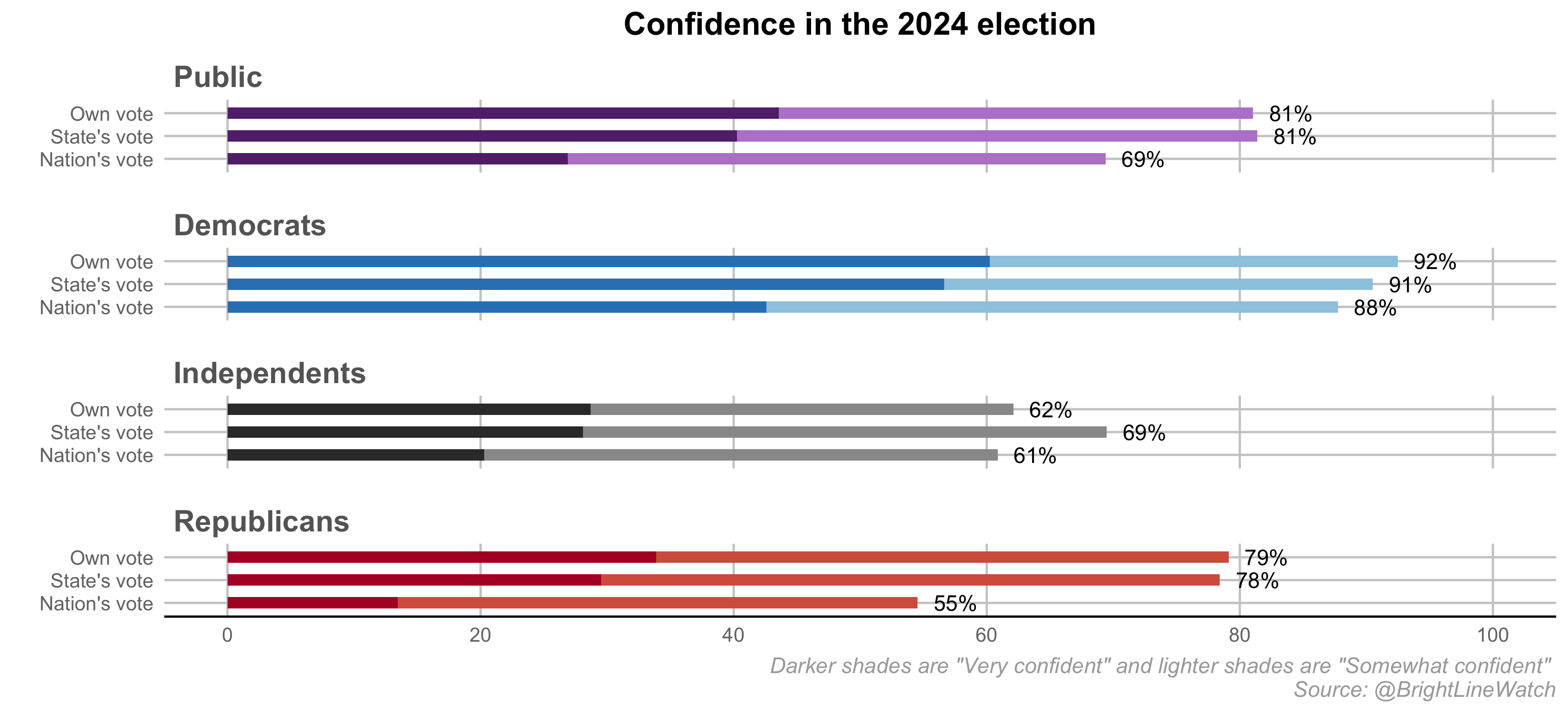
As in previous surveys, we observe a substantial decrease in public confidence in the vote count as we move from the state level (81%) to the national level (69%). Among Democrats, confidence declines only slightly from the local (92%) to the state (91%) to the national (88%) level. The shift is instead driven by Republicans. Confidence at the state level is nearly as high at the local level (78% and 79%, respectively), but drops off sharply to 55% at the national level.
Public acceptance of Biden’s victory in 2020
As in previous surveys, we asked Americans about whether they view the 2020 presidential election as legitimate. The figure below shows the share of respondents across different partisan groups who state that Biden was “definitely” or “probably” the rightful winner. Attitudes on this question remain deeply polarized across parties. As Americans prepare to cast ballots in the 2024 presidential election, a supermajority of Republicans still do not recognize the outcome of the previous election. Attitudes on this question are mostly stable over time, although we note the continuation of a gradual drift upward among independents in acceptance of Biden’s victory.
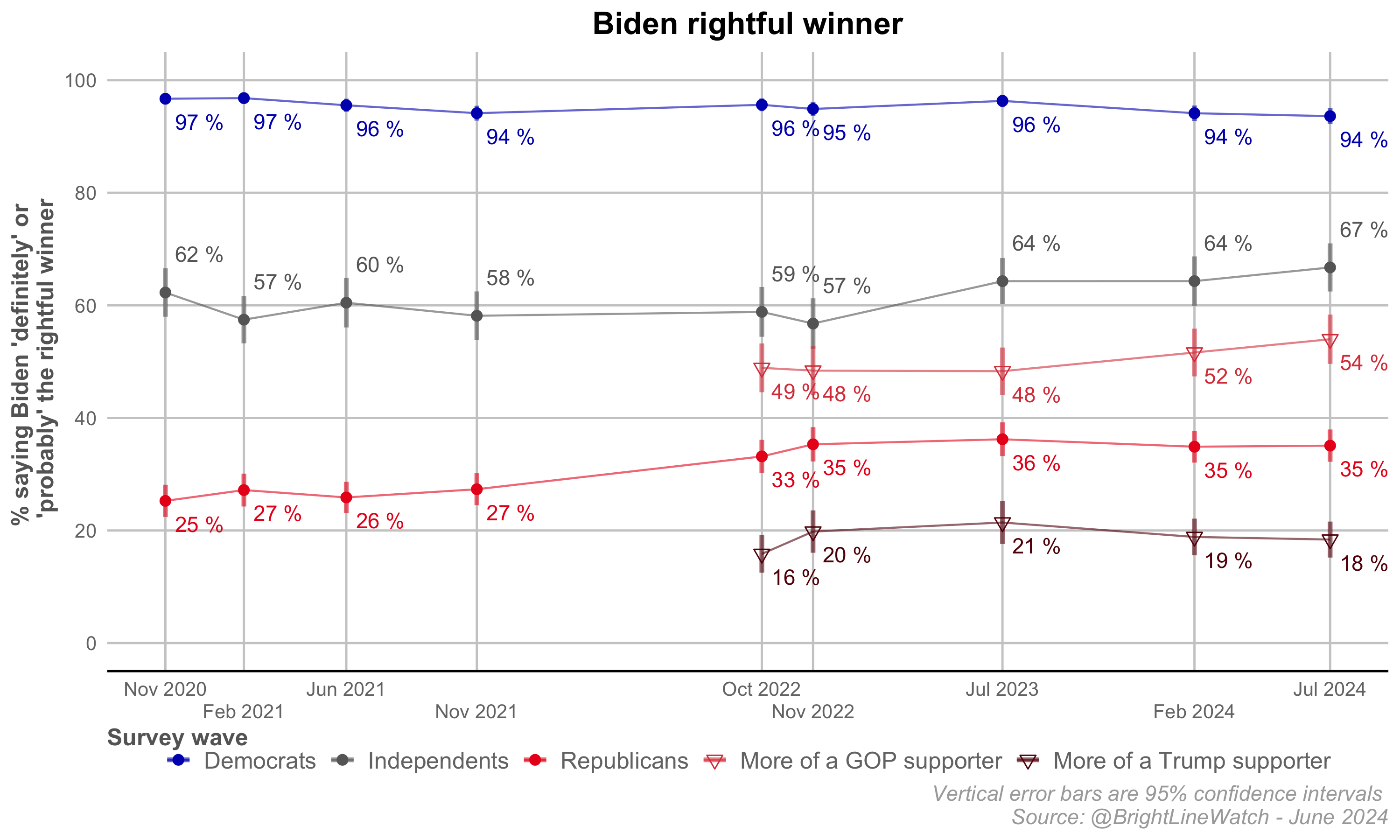
The breadth and persistence among Republicans of rejecting Biden’s 2020 win is striking. We sought to determine whether this phenomenon is singular to Republicans’ views of that election or reflects broader skepticism about election legitimacy. In this survey, we therefore also asked participants in our public sample whether Barack Obama was the rightful winner over Mitt Romney in 2012 and whether Donald Trump was the rightful winner over Hillary Clinton in 2016. The results, overall and disaggregated by partisanship, are presented in the next figure for each of the last three presidential elections.

Starting with the 2016 election, partisan rejection of opposition victories has decreased acceptance of election results. Democrats overwhelmingly accept their party’s victories in 2012 (97%) and 2020 (94%), but almost one in three reject Trump’s win in 2016. Republicans mostly acknowledge Obama’s win in 2012 (84%) and fully embrace Trump’s (94%) but utterly reject Biden’s (35%). Confidence among independents, by contrast, has dropped with each election, declining from 88% for 2012 to 75% for 2016 to 67% for 2020. The net result is a steady decline in acceptance of elections by the public overall, which decreases from 90% for 2012 to 77% for 2016 and 66% for 2020.
With that said, Republican rejection of the 2020 election has no precedent across parties in recent elections. The lower levels of acceptance of recent elections that we see among Democrats (a low of 62% for 2016) and independents (67% for 2020) are not nearly as low as we see for Republicans for 2020 (35%).
Ratings of the state of U.S. democracy
As in each Bright Line Watch survey, we asked both expert and public respondents to rate the overall performance of U.S. democracy on a 0–100 scale. Expert ratings, which ticked up in November 2022 after the midterm elections, have stabilized in our two most recent surveys near their highest point since we began our surveys in 2017. In June 2024, the average expert rating was 70.0. The public overall is consistently less sanguine than our experts, with an average rating of 56.9. Democrats rate American democracy somewhat higher (62.7) whereas Republicans put it a bit lower (54.4).
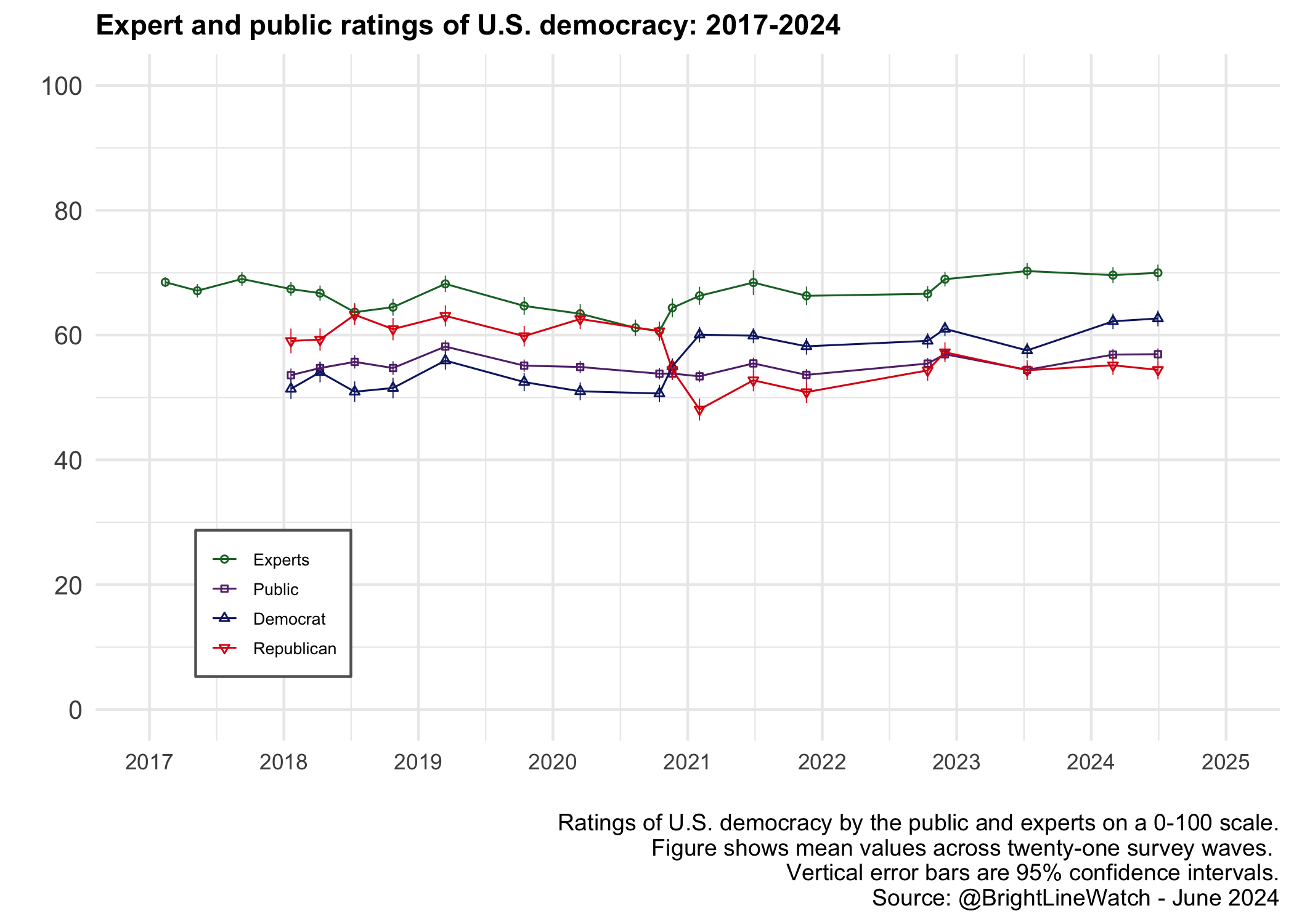
Finally, the June survey also asked expert participants to separately project the state of American democracy in 2027 on the same 0–100 scale assuming that either Biden or Trump wins the 2024 presidential election. (The survey was fielded before the current controversy over Biden’s fitness and thus did not ask about Kamala Harris or other possible Democratic candidates.) The experts anticipate improvement from 70.0 now to 74.1 in 2027 if Biden is re-elected, whereas they project a major decline to 50.6 by 2027 if Trump wins in November. (Expert ratings never sank below 60 during Trump’s first term, but many observers believe he would face fewer constraints in a second term. The projected rating of 50.6 is similar to how experts rated democracy in Brazil prior to Jair Bolsonaro’s defeat in 2022.)
Events
As in previous surveys, we asked experts to rate a selection of events as normal or abnormal and as important or unimportant. In a departure from past practice, we asked questions about recent events (from 2024) as well as a selection of events from 2017–2023 that we had previously asked our experts to rate. To ensure comparability, we reused the original wording from past surveys but added some indication of when each event took place. The lists of events with the exact text shown to respondents are provided in the appendix.
We first consider how experts evaluate recent events. Average ratings provided by our experts for these events are plotted on the figure below.

Experts rated some of these events as relatively normal, though they perceived some differences in importance between, for instance, Nikki Haley dropping out of the GOP presidential race (rated between semi-important and mostly unimportant on average) and Biden seeking a Middle East ceasefire (mostly important on average). A series of events related to Biden and Trump were rated near the borderline normal level — concerns about Biden’s acuity (measured before the first debate), Pence’s refusal to endorse Trump, and Hunter Biden being found guilty in a federal gun case. Finally, a cluster of events were rated as both highly abnormal and important, the quadrant of the graph shaded in gray above. We zoom in on the shaded area in the graph below, which provides past expert ratings of the most important and abnormal events of recent years for context.

As the figure shows, five recent events fall in or near the quadrant in question — Trump’s indictments in Georgia and Florida, his conviction in New York, Senator Marco Rubio’s refusal to commit to accept the results of the 2024 election, and Trump’s description of his political opponents as “vermin.” However, none of these are rated as being as important and abnormal as the most extreme events of recent years (e.g., insurrectionists storming the Capitol on January 6 and Trump calling the Georgia Secretary of State asking to “find” votes).
Appendix
Bright Line Watch conducted its twenty-first survey of academic experts and its eighteenth survey of the general public from June 20–30, 2024. Our public sample consisted of 2,778 participants from the YouGov panel who were selected and weighted to be representative of the U.S. adult population. We also surveyed 557 political science experts across a diverse range of subfields. Our email list was constructed from the faculty list of U.S. institutions represented in the online program of the 2016 American Political Science Association conference and updated by reviewing department websites and job placement records from Ph.D. programs in the period since.
All estimates shown in the report used weights provided by YouGov. Our expert sample is unweighted because we do not collect demographic data to protect anonymity. Error bars in our graphs represent 95% confidence intervals. Data are available here.
Both the expert and public samples in Wave 18 responded to a battery of questions about democratic performance in the United States. Afterward, they were asked to evaluate the quality of American democracy overall on a 100-point scale.
How well do the following statements describe the United States as of today?
- The U.S. does not meet this standard
- The U.S. partly meets this standard
- The U.S. mostly meets this standard
- The U.S fully meets this standard
- Government officials are legally sanctioned for misconduct
- Government officials do not use public office for private gain
- Government agencies are not used to monitor, attack, or punish political opponents
- All adult citizens enjoy the same legal and political rights
- Government does not interfere with journalists or news organizations
- Government effectively prevents private actors from engaging in politically-motivated violence or intimidation
- Government protects individuals’ right to engage in unpopular speech or expression
- Political competition occurs without criticism of opponents’ loyalty or patriotism
- Elections are free from foreign influence
- Parties and candidates are not barred due to their political beliefs and ideologies
- All adult citizens have equal opportunity to vote
- All votes have equal impact on election outcomes
- Elections are conducted, ballots counted, and winners determined without pervasive fraud or manipulation
- Executive authority cannot be expanded beyond constitutional limits
- The legislature is able to effectively limit executive power
- The judiciary is able to effectively limit executive power
- The elected branches respect judicial independence
- Voter participation in elections is generally high
- Information about the sources of campaign funding is available to the public
- Public policy is not determined by large campaign contributions
- Citizens can make their opinions heard in open debate about policies that are under consideration
- The geographic boundaries of electoral districts do not systematically advantage any particular political party
- Even when there are disagreements about ideology or policy, political leaders generally share a common understanding of relevant facts
- Elected officials seek compromise with political opponents
- Citizens have access to information about candidates that is relevant to how they would govern
- Government protects individuals’ right to engage in peaceful protest
- Law enforcement investigations of public officials or their associates are free from political influence or interference
- Government statistics and data are produced by experts who are not influenced by political considerations
- The law is enforced equally for all persons
- Politicians who lose free and fair elections publicly concede defeat
The figure below breaks out performance ratings on each of 30 democratic principles. The markers for each principle indicate the percentage of expert (green) and public (purple) respondents who regard the United States as fully or mostly meeting the standard (as opposed to meeting it partly or not at all). Consistent with the overall ratings, the experts rate U.S. democratic performance more positively than the public overall. Few exceptions exist, however, such as voting rights being equally protected for all citizens, politicians operating with a common understanding on factual matters, and electoral districts not systematically favoring one party over the other.

The figure below shows expert likelihood assessments and Republican approval of Trump 2nd term scenarios, separately for respondents who say they are primarily supporters of Trump and those who say they are primarily supporters of the Republican Party.

The figure below shows the relative sizes of these two factions within the Republican Party over multiple Bright Line Watch surveys waves (October 2022 — June 2024).
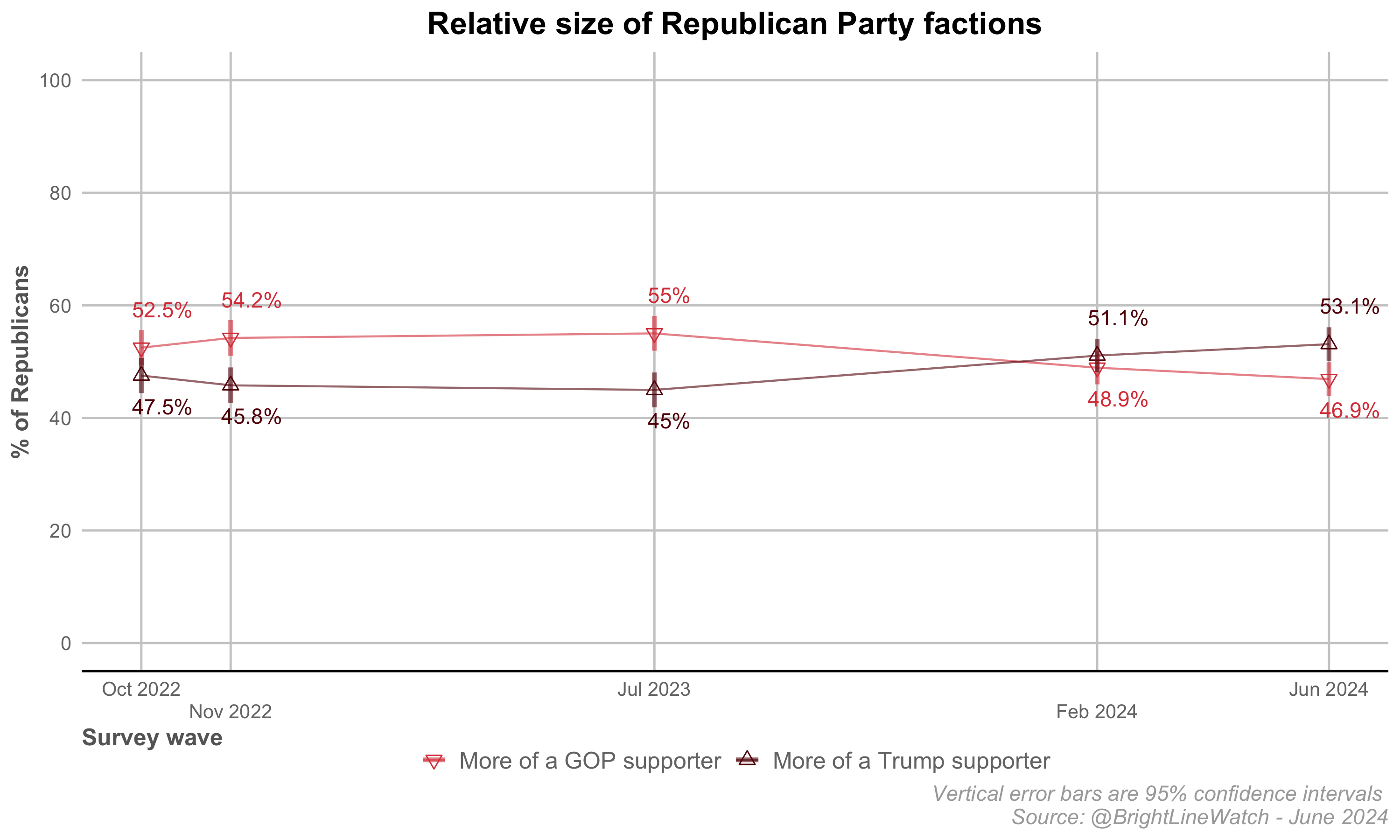
- Normal
- Mostly normal
- Borderline normal
- Mostly abnormal
- Abnormal
Is this unimportant or important?
- Unimportant
- Mostly unimportant
- Semi-important
- Mostly important
- Important
Events list
- News outlets report that both Democrats and Republicans on Capitol Hill are concerned about Joe Biden’s mental acuity
- Hunter Biden, the son of President Joe Biden, is found guilty of making a false claim on a gun application
- Former president Donald Trump is found guilty on 34 counts of falsifying business records in his New York trial
- Senator Marco Rubio of Florida, a frontrunner to be Donald Trump’s running mate, does not commit to accepting the results of the 2024 election “no matter what happens”
- Former vice president Mike Pence announces he will not be endorsing Donald Trump ahead of the 2024 presidential election
- Donald Trump characterizes his political opponents as “vermin”
- The Pentagon announces $275 million weapons package from the US to Ukraine
- Nikki Haley drops out of 2024 presidential race
- Trump and 18 allies charged with election meddling in Georgia
- Mike Johnson elected Speaker of the House
- Trump campaign begins vetting potential vice presidential candidates
- Biden rolls out asylum restrictions to help ‘gain control’ of the border
- Biden administration seeks to negotiate a ceasefire between Israel and Hamas
- Donald Trump indicted in New York hush money case
- Donald Trump is indicted by special counsel Jack Smith for his handling of classified documents after leaving office
- Media reports indicate that flags associated with the “Stop the Steal” movement were flown at two properties belonging to Supreme Court Justice Samuel Alito
- Trump is fined $354 million in civil fraud trial for inflating property values
